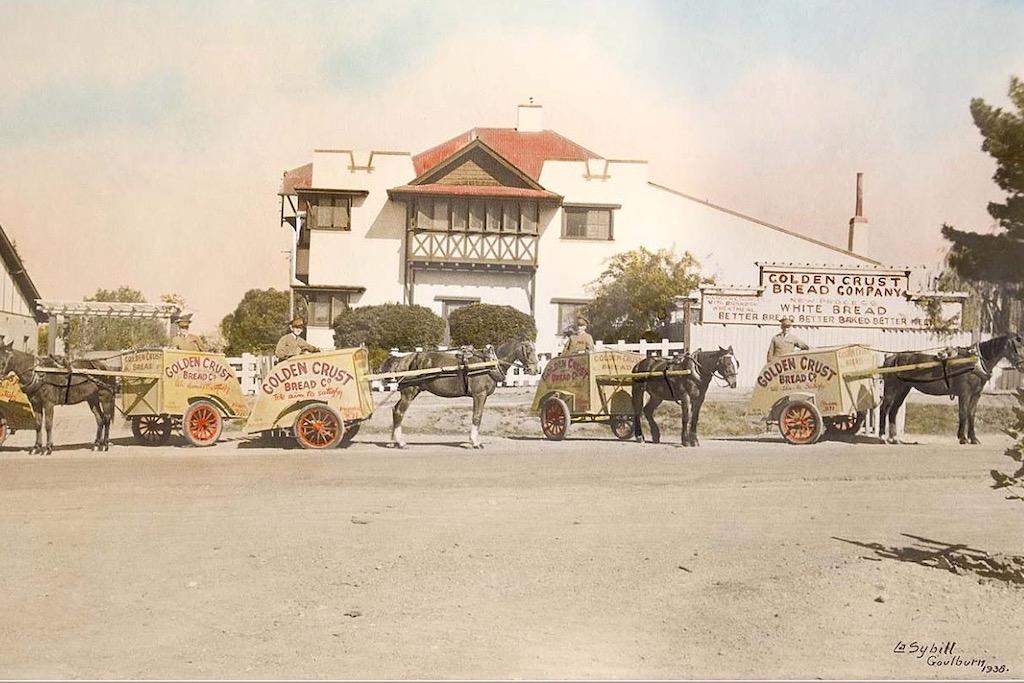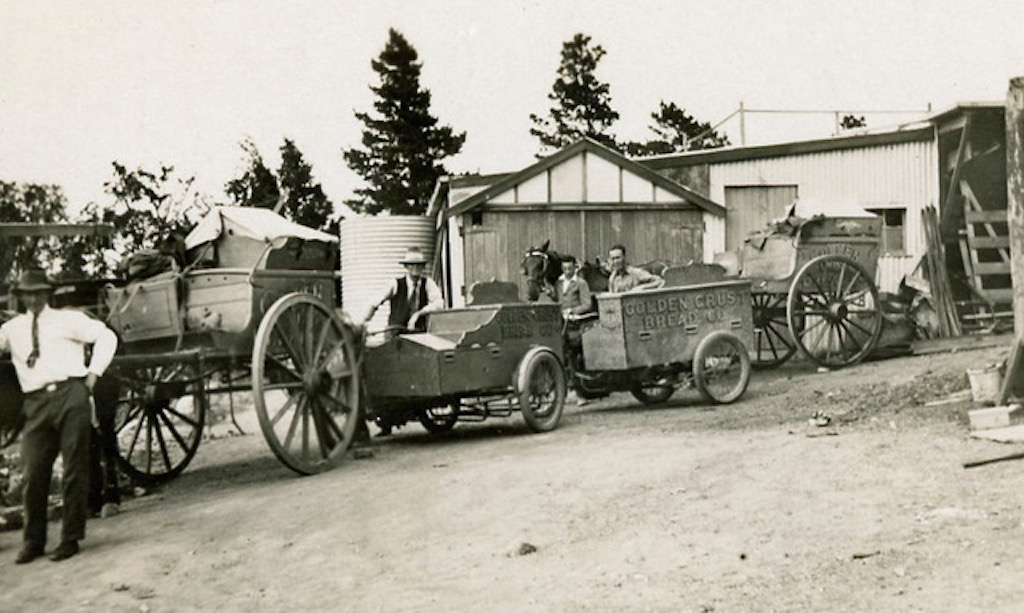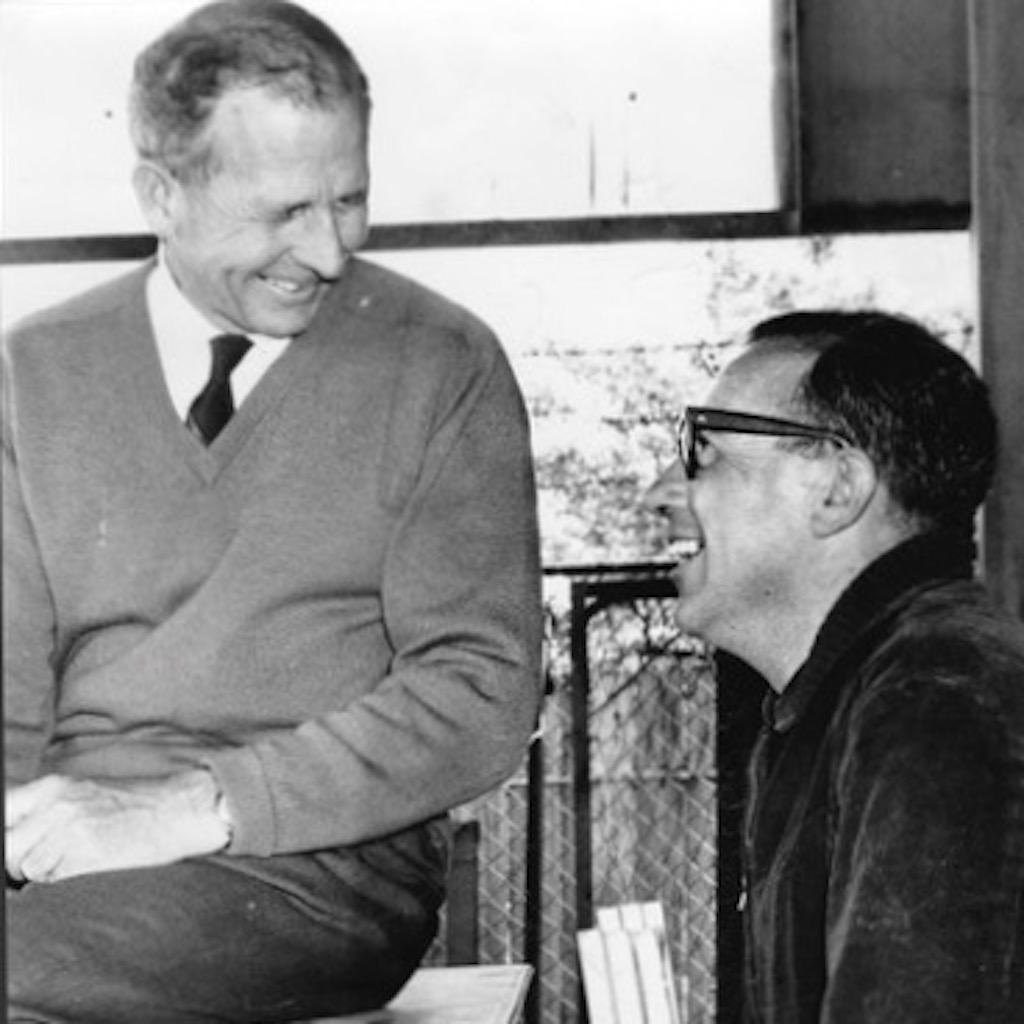
Arthur Thwaite’s homemade baker’s carts, designed by his son Bill, outside 64 Addison Street, Goulburn, about 1938. Arthur bought the home in the early 1930s. Photo: John Thwaite collection.
A two-storey block of seven flats in Addison Street, Goulburn, on the market for $2.25 million, holds memories of a prolific builder and enterprising baker who made chariot-like carts to deliver his bread.
A plumber from Sydney, Arthur Thwaite built numerous homes in Goulburn and added seven flats to the double-storey home at 64 Addison Street. A bakery was added to the back of the flats, on a site of almost 4000 square metres.
Well before constructing the bakery, Arthur was making a name for himself as a builder. Historian Linda Cooper unearthed an eerie snippet of news from October 1927. Two of his workers renovating two homes in Lithgow Street, Goulburn, found a human jaw bone under the floor, with several teeth still embedded in it. It had been there for decades.
Beginning about 1931, Arthur’s new Golden Crust bakery had an oven and a truck and progressed to two double-decker and four single-decker ovens, seven carts and two motor vehicles.
He and his wife Kate had five sons, Robert (Bob), Thomas (Tom), Eric, William (Bill) and Arthur Jnr, and a daughter, Jean. He brought Bill and Tom into the business as directors and at one stage 29 people worked for the bakery.
Writing to the National Museum of Australia in 2014, Bob’s son John recounted growing up at 64 Addison Street in the 1950s and ’60s and well remembers the horses and carts.
“Some of the horses were so familiar with the delivery route they would walk to the next house so the bread carter did not have to go back and get the cart each time,” John wrote for the museum’s ‘’Horses in Australia’’ project.
“On the other hand a few horses would occasionally bolt and go back to the bakery without the bread carter who would then have to walk back. Some children were able to get a lift home on the bread cart after school if they lived on the way back to the bakery.
“The carts were made by my grandfather who was also a plumber and builder and had a large workshop next to the bakery. My father’s brother Bill (who later became a prominent real estate agent) was the designer of the carts.”

Golden Crust Bread delivery vehicles in 1934. There are two horse-and-carts and two motorcycles with sidecars outside the bakery. These vehicles pre-date the chariot-type carts. Photo: John Thwaite collection.
Museum volunteer Kylie Carman-Brown turned up an amusing story. On 28 June, 1935, the Goulburn Evening Penny Post reported on a prospective barrow contest. Two of the bakery employees, Alan Wilson and Jim James, had agreed to a time trial over a three-mile course (about 4820 metres) from the bakery to the summit of Governor’s Hill. It was for a bet, and not with the intention of getting a better appreciation of the delivery horses’ life.
Between 200 and 300 people watched the start, while others used trucks parked in the streets as grandstands from which to observe. Wilson pushed James in the barrow and took 53 minutes, excluding two permitted rest stops. The whole thing was done for a bet of one pound, and it was reported that neither would attempt it again for less than 10.
Another newspaper article, in May 1932, recounts Arthur before a magistrate, on a charge brought by the Breadcarters’ Union of working three bread carters before 6 am, for which he was fined several pounds.
According to the Goulburn Evening Penny Post, the bakery employees formed a rugby league team, ‘’Thwaite’s Men’’ and challenged another team, ‘’The Rest’’, to a game of footy at League Park in September 1934.
Thwaite’s Men threatened their opponents that if they were playing for a crust (even a Golden Crust), they would starve. But The Rest fired back, advising punters to put all their ‘’dough’’ on their side. A subsequent report of celebrations of the Bakers Cup is unclear about who won.
To continue to expand the bakery, Arthur bought a business in Auburn Street, P. and W. McIntyre’s City Bakery, and baked all kinds of plain and fancy bread, cakes and pastries.

John’s father Bob Thwaite (left) with Tom McKavanagh in the early 1970s at a Rotary fundraising event. Photo: John Thwaite collection.
John thinks his grandfather sold the bakery to another family by the name of Triglone, who subsequently sold it to Col Ferguson. Bob Thwaite worked as a builder with Arthur and later took on the Esso depot in Braidwood Road, Goulburn.
Arthur had also bought a property at Taralga. He died on 21 May, 1961, leaving an indelible mark on the Goulburn business community and lasting memories of the smell of freshly baked bread.







